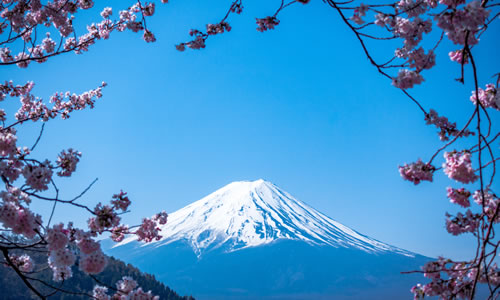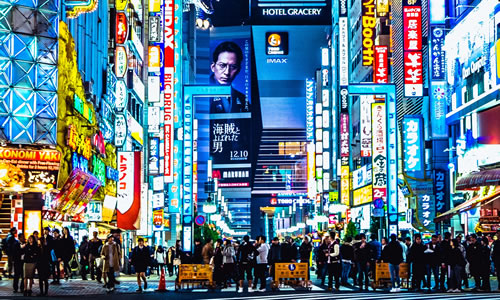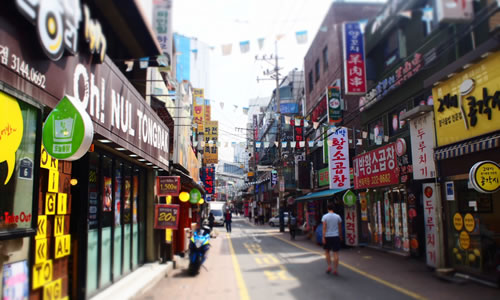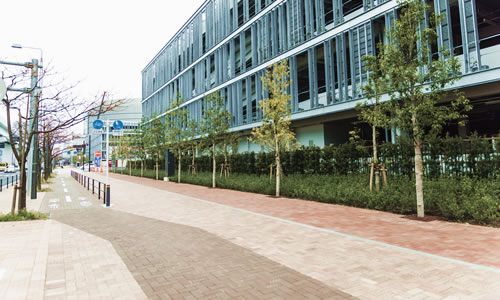Living and working in Japan offers many great experiences and opportunities. Japan is a unique place for foreigners. You can find many traditional and historical features like sushi, Kabuki Theater, and Shinto or Buddhist rituals. However, you also find many hints of Western influence like MacDonald’s, fashion, and even English that seem to pervade everything from music to advertising. Yet, the more you observe the Western aspects in Japanese society, the more you begin to see that it’s not quite the same. Japanese society has a history of embracing other cultures, ideas, and traditions, but not before adding a Japanese spin to it; and what we are left with is something unique, not quite Western but not quite Japanese. Living in Japan gives you a great opportunity to really see and explore all of these interesting facets of Japanese society. Below are some reasons that some teachers have come to Japan, though this list is not exhaustive.
-
Place

There are a lot of great places to visit and things to do while in Japan. Although the relatively small size of Japan makes things a little more crowded, it also means that traveling around Japan is much easier, especially with its wonderful transportation system. The trains are almost always on-time, comfortable, and easy to use after a little practice. It’s quite easy and enjoyable to jump on the train and go on a day trip or weekend trip. Heart School is based in the eastern part of the main island (Honshu) known as Kanto. There are plenty of great places in this area including Tokyo, Yokohama, Nikko, and Mount Fuji to name a few. Please visit www.japan-guide.com to take a closer look at all the amazing places in Japan.
-
Modern Country

As a modern country, living in Japan is not so difficult. Apart from the language difference, transitioning to life in Japan is fairly easy. It has all the modern conveniences that other countries do including an excellent public transportation system that rivals any in the world, fast Internet, smartphones, convenience stores, modern shopping malls, cutting-edge technologies, air-conditioning and heating in most public places, etc. You can also get many, though not all, of the same foods you usually enjoy at home. Fast food restaurants are also prolific. You can catch a lot of Western shows and movies on TV in English, or you can go to the movie theater to watch the newest movie releases in English. Although life in Japan is not the same as in your home country, there are still a lot of modern conveniences to help reduce any adjustment shock.
-
Fun things

There are a lot of fun things you can do in Japan that you can’t do in other countries. One great experience is during spring, called hanami. When the cherry blossoms begin to bloom, people all over Japan go with their friends and family to parks or temples and sit under the beautiful blossoms, drinking, eating, and enjoying the scenery.
Karaoke is also another fun experience. Of course, there is karaoke in other countries, but it’s usually only in bars or restaurants and you have to sing in front of a lot of strangers. In Japan, however, there are karaoke bars where you rent your room and only sing in front of your friends or family. And to reduce anxiety, even more, there is a phone in the room that connects you directly to the kitchen, and the staff will bring food and drinks directly to your room!
Some establishments are a mix between a bar and a restaurant called izakaya. It’s not exactly like a bar and not exactly like a restaurant. Often it is a more intimate environment where you and your group are separated completely or partially from others, and you order many little dishes and alcohol. It’s a great way to enjoy the company of your friends, family, or coworkers and unwind from a stressful day or week. There are of course many other unique activities one can do in Japan; there is a lot to look forward to.
-
Safe

Japan is a relatively safe place to live. Although any place you live has some inherent dangers, Japan is relatively safe. There is little crime compared to other countries, and because of the strict gun and drug laws, there is virtually no gun or drug-related violence. There are even cases where people leave their purse or bag on a train and can recover it after contacting the train station. Unfortunately, there are a lot of earthquakes, which may scare many people who are not used to them, but earthquakes are accepted as an inherent part of life in Japan. As a result, Japan is fairly well prepared for earthquakes. Buildings are built to withstand even very strong earthquakes. While it’s impossible to be completely safe, Japan is nonetheless well equipped to deal with earthquakes. (*This is not to say that crime and devastating disasters are not a problem. They happen and you must still be cautious, but compared to other countries, Japan remains a relatively safe place to live.)
-
Asia

While living in Japan, traveling to other places in Asia is easier and cheaper. If you live and work in Japan, it will become easier to make short trips to many other countries in Asia like Korea, Thailand, Vietnam, India, or China.
-
Clean

Japan is quite clean and sanitary. Japan is, for the most part, a very clean country. Even in big cities, you don’t find as much trash or pollution as you might expect. Perhaps it’s out of necessity since Japan is a small country, or perhaps it’s because of some sense of social or personal responsibility, but most places are kept very clean, from the streets and parks to the trains and stores.
-
Culture

Although the list goes on, here are some other quick features of Japan that have attracted foreigners: fashion, music, manga, anime, food, hot springs, friendliness, respectfulness, and history.
Although like with any country, Japan has its negative side, it needs to be kept in perspective. Due to Japan's small size, nearly everything seems smaller and expensive –the portions of food, cars, apartments, etc. Also, most Japanese people are friendly and respectful (even if they don't like you), however, there can be incidents of discrimination or unfriendliness.
It is important to research whether there are any negative aspects of Japan that you are unable to handle before committing to move. With this said, the experiences of most people living and working in Japan have been overwhelmingly positive, and there are many more benefits to challenging yourself than there is in never trying anything new.